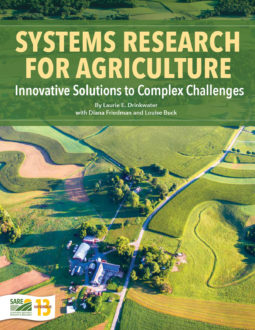- Agricultural Systems: Agroecology and Rural Innovation for Development. 2008. Snapp, S., and B. Pound, eds. Elsevier: Burlington, MA. Geared more toward international agricultural development, this book covers a wide range of topics related to ecological applications that support agricultural sustainability and stakeholder participation in problem-solving and innovation.
- The Ecological Knowledge System. 1998. Roling, N.G., and J. Jiggins. In Facilitating Sustainable Agriculture, ed. N.G. Roling, and M.A. Wagemakers, pp. 283–311. Cambridge University Press: Cambridge, UK. This chapter outlines a rationale and framework for understanding the policy, institutional, and behavioral changes necessary for transition to sustainable agriculture. The method emphasizes that ecologically sound agriculture requires change not only at the farm level but also at higher agroecosystem levels such as watersheds and landscapes, and that interactive learning among stakeholders fosters the required innovation.
- Ecology in Agriculture. 1997. Jackson, L.E., ed. Academic Press: San Diego, CA. A compilation of chapters by various authors provides examples of the application of ecological theory to agricultural systems. Ecophysiology and population and community ecology are discussed by several authors with distinct perspectives on these fields and their application to agriculture.
- Farmer First: Farmer Innovation and Agricultural Research. 1989. Chambers, R., A. Pacey, and L.A. Thrupp, eds. Intermediate Technology Publications: London. A landmark publication that documents and characterizes farmers’ capacities for innovation and their potential for assuming leadership roles in agricultural research in small farming systems throughout the world.
- The Farming Systems Research and Extension Approach to Small Farmer Development. 1990. Baker, D., and D. Norman. In Agroecology and Small Farm Development, ed. M. Altieri and S. Hecht, pp. 91–104. CRC Press: Boca Raton, FL. This chapter provides a detailed review of the farming systems research (FSR) approach and an assessment of its contribution to understanding and advancing small farmer development strategies throughout the world. It includes examples of FS projects and programs and highlights factors that limit the potential of this approach.
- The Farming Systems Trial: The First Fifteen Years. 1999. Peterson, C., L.E. Drinkwater, and P. Wagoner. Rodale Institute: Kutztown, PA. An interpretive overview of the cropping systems experiment at Rodale Institute, including its design and a survey of results.
- Field Crop Ecology: Managing Biological Processes for Productivity and Environmental Quality. 1998. Cavigelli, M.A., S.R. Deming, L.K. Probyn, and R.R. Harwood, eds. Michigan State University Bulletin E-2646: East Lansing, MI. This extension bulletin gives a nice overview of applied ecology in a production context.
- Implementation of long-term agricultural systems studies: challenges and opportunities. 2002. Barbercheck, M.E., M. Bell, C. Brownie, N.G. Creamer, S. Hu, L. Kin, H.M. Linker, F.J. Louws, M. Marra, J.P. Mueller, C.W. Raczkowski, D. Susko, and M.G. Wagger. HortTechnology 12: 362–368. An overview of how the systems experiment at North Carolina State was established.
- Michigan Field Crop Pest Ecology and Management. 2000. Cavigelli, M.A., S.R. Deming, L.K. Probyn, and D.R. Mutch, eds. Michigan State University Bulletin E-2704: East Lansing, MI. Follows the previous bulletin and focuses on pest management in field crops.
- Organic Farming: The Ecological System. 2009. Francis, C., ed. American Society of Agronomy, Crop Science Society of America, and Soil Science Society of America: Madison, WI. This book includes chapters that explicitly discuss the role of ecological processes in organic farming systems.
- Principles of Terrestrial Ecosystem Ecology. 2002. Chapin, F.S., III, R.A. Matson, and H.A. Mooney. Springer-Verlag: New York, NY.
Systems Research for Agriculture
Chapter One
SARE Outreach
| 2016 | 96 pages
PDF (1.8 MB)
or call (301) 779-1007 to order.
